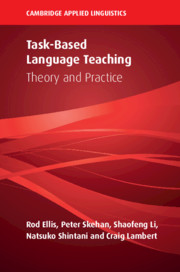Book contents
- Task-Based Language Teaching
- The Cambridge Applied Linguistics Series
- Task-Based Language Teaching
- Copyright page
- Contents
- Figures
- Tables
- Series Editors’ Preface
- Authors’ Preface
- Part I Introduction
- Part II Theoretical Perspectives
- Part III Pedagogical Perspectives
- 7 Task-Based Syllabus Design
- 8 Methodology of Task-Based Language Teaching
- 9 Task-Based Testing and Assessment
- Part IV Investigating Task-Based Programmes
- Part V Moving Forward
- Endnotes
- References
- Index
7 - Task-Based Syllabus Design
from Part III - Pedagogical Perspectives
Published online by Cambridge University Press: 07 October 2019
- Task-Based Language Teaching
- The Cambridge Applied Linguistics Series
- Task-Based Language Teaching
- Copyright page
- Contents
- Figures
- Tables
- Series Editors’ Preface
- Authors’ Preface
- Part I Introduction
- Part II Theoretical Perspectives
- Part III Pedagogical Perspectives
- 7 Task-Based Syllabus Design
- 8 Methodology of Task-Based Language Teaching
- 9 Task-Based Testing and Assessment
- Part IV Investigating Task-Based Programmes
- Part V Moving Forward
- Endnotes
- References
- Index
Summary
This chapter examines four different proposals for designing a task-based course. In Prabhu’s Communicational Language Teaching Project, the syllabus has low internal structure, leaving implementation issues to be decided by teachers. In Long’s syllabus, tasks have a training function. Target tasks are identified by a needs analysis and then restructured into pedagogic tasks. Robinson’s is the most ambitious proposal as he proposes a syllabus that takes into account the cognitive complexity of tasks, their propensity for promoting the kinds of interaction that facilitate acquisition, and the cognitive abilities and affective dispositions of individual learners. Finally, Ellis identifies a range of factors that influence task complexity but suggests that sequencing tasks is largely a matter of intuition that can be guided only roughly by these factors. In Ellis’s proposal there is room for a more traditional, structural module to fit alongside a task-based module in a complete course.
Keywords
- Type
- Chapter
- Information
- Task-Based Language TeachingTheory and Practice, pp. 179 - 207Publisher: Cambridge University PressPrint publication year: 2019
- 1
- Cited by

